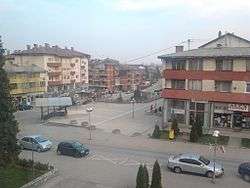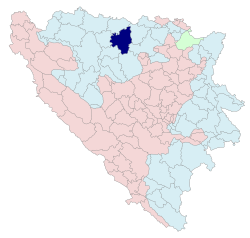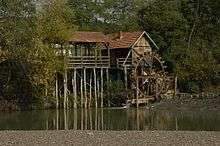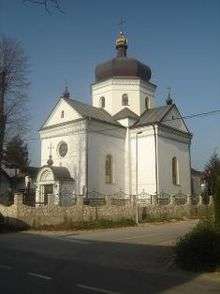Prnjavor, Bosnia and Herzegovina
| Prnjavor Прњавор | |
|---|---|
 | |
 Location of Prnjavor within Republika Srpska | |
| Country | Bosnia and Herzegovina |
| Entity | Republika Srpska |
| Government | |
| • Mayor | Siniša Gatarić (SDS) |
| Area | |
| • Total | 629,95 km2 (24,323 sq mi) |
| Population (2013 census) | |
| • Total | 38,399 |
| • Density | 61/km2 (160/sq mi) |
| Time zone | CET (UTC+1) |
| • Summer (DST) | CEST (UTC+2) |
| Area code(s) | 51 |
| Website | www.opstinaprnjavor.net |
Prnjavor (Serbian Cyrillic: Прњавор, pronounced [prɲǎːʋɔr]) is a town and municipality in northern Bosnia and Herzegovina and is a part of the Republika Srpska entity. The municipality is near the town of Banja Luka, which is located to the west of Prnjavor.
History
Even over 700 years ago people recognized the economic potential of the area of the present-day Municipality of Prnjavor. Although there had been some settlements from the Roman period here, significant colonization and settlement (including the construction of monasteries, such as the one of at Stuplje) took place only in the Middle Ages. According to historical sources, medieval monasteries had their landed properties called Prnjavori, and the locals living there were called Prnjavorci. This is believed to be the origin of the name Prnjavor.
During the Ottoman period the region suffered from border conflicts with the Austrian Empire. The first time Prnjavor was mentioned in recorded history was in 1829. The current settlement itself is believed to me of a more recent date. In the mid-19th century and according to the records of the travel writer Jukić, Prnjavor had about a hundred houses and around a thousand inhabitants.
In 1878 Austria-Hungary occupied Bosnia and the authorities decided the Prnjavor area was under-populated. Efforts were undertaken to attract settlers from other parts of the empire and consequently the municipal area was settled by Italians, Ukrainians, Czechs, Poles, Hungarians and German-speaking folk from Austria, Germany, Bohemia, Hungary and Russia. Although over half the population remained Orthodox Serbs, the multi-ethnic character of the population led the municipality of Prnjavor to be nicknamed "Little Europe".
In 1918 Bosnia became part of Kingdom of Serbs, Croats and Slovenes and all immigration stopped. During the interwar period between 1918 and 1941 Prnjavor underwent more significant economic development through the opening of craftsman workshops, hotels, more shops and a few manufacturing plants. From 1929 to 1941 Prnjavor was part of the Vrbas Banovina of the Kingdom of Yugoslavia.
Following the collapse of internal security during World War II the Nazis decided to evacuate the Volksdeutsche (ethnic German) population from Bosnia and a treaty to this effect was signed with the Croatian Ustaše regime on 30 September 1942. After 1945 the Communist regime of Josip Broz Tito repopulated the Volksdeutsche villages with Serbs and destroyed or obscured all evidence of German history and heritage in the region.
During the Socialist period of the Socialist Federal Republic of Yugoslavia Prnjavor was not a highly developed municipality within Bosnia and Herzegovina.
Demographics
1910
According to the 1910 census, the majority in the Prnjavor Municipality were Orthodox Christians (60.89%).
1921
49,893 total
- Serbs and Croats - 34,164
- Poles - 6,283
- Ruthenians (or Ukrainians) - 5,997
- Germans - 1,486
- Romanians - 556
- Czechoslovaks - 482
- Hungarians - 371
- Italians - 292
- Slovenes - 108
- Others - 152
1971
46,734 total
- Serbs - 35,177 (75.27%)
- Bosniaks - 6,143 (13.14%)
- Croats - 2,148 (4.59%)
- Yugoslavs - 96 (0.20%)
- others - 3,170 (6.80%)
1991
In 1991, the municipality of Prnjavor had a population of 46,894 people, including:
- 33,575 Serbs
- 7,153 Bosniaks
- 1,737 Croats
- 1,718 Yugoslavs
- 2,711 others
Demographic history
In the end of the 19th century, during Austria-Hungary, then sparsely populated area of the Municipality of Prnjavor was colonized by settlers from Eastern and Central Europe (Ukraine, Italy, Hungary, Poland, Germany, Austria, Bohemia, Slovakia, etc.). At the time of the former Socialist Federal Republic of Yugoslavia and due to numerous national minorities (about 20) Prnjavor was called "Little Europe". Except the Ukrainian, Italian and Czech national minorities the others were mainly small communities. But, even today, besides the constitutive nations of Serbs, Croats, and Bosniaks, a small number of Hungarians, Slovaks, Germans, Polish, Slovenes, Bulgarians, Romanians, ethnic Macedonians, Jews, and Russians live in Prnjavor.
Sport
The local football club, FK Ljubić Prnjavor, plays in the First League of the Republika Srpska.
Resources


Farmlands: 437.79 km2 (169 sq mi)/68.8%
Cultivable land: 382.64 km2 (147.74 sq mi)
Forest resources: 173.39 km2 (66.95 sq mi)
Water resources: The Ukrina River, Drenova Lake
Economy
Talking a long-term view the Municipality of Prnjavor as decided on encouraging small and medium-size business. Since the state company privatization has been going on in the last seven years, the private small and medium-size firms have been bound to absorb the social strike. The procedure of issuing building permits has been simplified and at same time building sites for new firms have been provided in due time and according to a plan. During the designing of the new egioal planning documents special attention has been paid to the need of the investment in the development of the local community. Prnjavor has become an interesting place for investors, above all for the people having earned their caital in Western European countries, where according to some estimates, some 6 000 Prnjavor's citizens have been employed.
In 2000 the private sector employed 1,900 people, and in 2005 the number was about three thousand, which indicates the expansion of the private enterprise in Prnjavor.
Private enterprises: 300
Self-supporting shops: 850
State-owned companies and institutions: 70
The employed: 5600
The unemployed: 3600
On 31 October 2005
Agriculture
Considering that almost four-fifths of the population live in rural areas and reckoning with great areas of cultivable land, with all reason agriculture has been recognized as the key branch of the economy considering the Municipality development. In the area of Prnjavor more than 200 km2 (49,000 acres) of land are cultivated while 6.1 km2 (1,510 acres) is planted with fruit crops.
Out of the total area of the cultivated farmlands, the cereal crops share is 77%, vegetable crops 10% while the rest has been sown with industrial crops, berries and fruit crops. New greenhouses are being constructed, health food production (organic agriculture) projects have been started to which the Municipality of Prnjavor has great predispositions due to the lack of significant industrial capacities as well as the preserved nature.
Tourism and leisure
The great areas of timber-lands as well as the Ukrina river and Drenova lake ar good foundation for hunt and fishing development. In 2003 a record catch (a 91 kg heavy catfish) was registered a this lake, otherwise being a fishing ground. The rich fish stocks, the Ukrina's banks covered with greenery and the old mills make this river specially attractive for all the nature and fishing lovers.
The hunting grounds on Mt. Motajica, in the forest lands of Čavka and Mt. Ljubić as well as the fishing ground of Ribnjak have again become destinations for hunters from Germany, Austria and especially Italy.
"Vučijak" Lipizzaner Horse Farm, founded in 1946, belongs to the group of the most famous horse farms from the time of ex-Yugoslavia. There are about fifty Lipizzaner head on it with significant presence of several breeding lins and stocks.
Kulaši Spa, 14 km (9 mi) from Prnjavor, has been known as a sanatorium ever since Austria-Hungarian rule in this area. Therapeutic factors: water is hyperalkalescent (pH 12.75) and includes hydrogen sulphide (H2S, HS+). The water is hyperthermal and its temperature is 28 °C (82 °F). Basic water characteristics: curative, oligomineral, thermomineral, hyperalkalic, chloride and sulphide water with the presence of calcium and sodium. Indications: degeneratve skin disease (psoriasis, eczema, hair root sebreae, acne etc.) postoperative conditions, inflammatory diseases of the bone-joint-and-muscle system, liver, stomach, kidney and urinary tract diseases etc.
Stuplje and Liplje monasteries are two twins and in books they are always mentioned together as the victims of burning during Turkish reign. After having been burnt by the Turks during Austria-Turkish war they were neglected. The foundations of Stuplje were found in Gornji Vijačani (village not far from Prnjavor) only in mid-1994. The reconstruction and building of this medieval monastery has been going on ever since.
The log-built church in Palačkovci is one of the most important cultural monuments in the Municipality. It is devoted to apostles Peter and Paul and was built in 1843 in the period of Turkish rule. In terms of its construction and engineering as well as aesthetically it is a real small master-piece of popular architecture. Even at the time of the od Yugoslavia it was declared a worldwide cultural heritage monument and was put under the protection of the state.
Twin towns – Sister cities
Prnjavor twinned with the following cities:
|
Notable people
- Milan Bjegojević, former basketball player and coach
- Vlada K. Petric, film director
- Rade Tomić Beli, musician
- Željko Smolić Smola, poet and writer
- Dejan Popović, athlete
- Igor Popović, football player
- Miloš Popović, athlete
- Nataša Petrović, athlete
- Nikola Petrović, athlete
- Željko Petrović, athlete
- Neven Subotić, football player
- Milan Marinković, former basketball player and coach
- Marko Todorović, actor
- Drago Kalabić, politician
- Dražen Petrović, tennis player
See also
References
External links
| Wikimedia Commons has media related to Prnjavor. |
- Official website
- Municipalities of Republika Srpska
- Radio Prnjavor
- Televizija K3 Prnjavor
- Banja Kulaši
Coordinates: 44°52′N 17°39′E / 44.867°N 17.650°E
